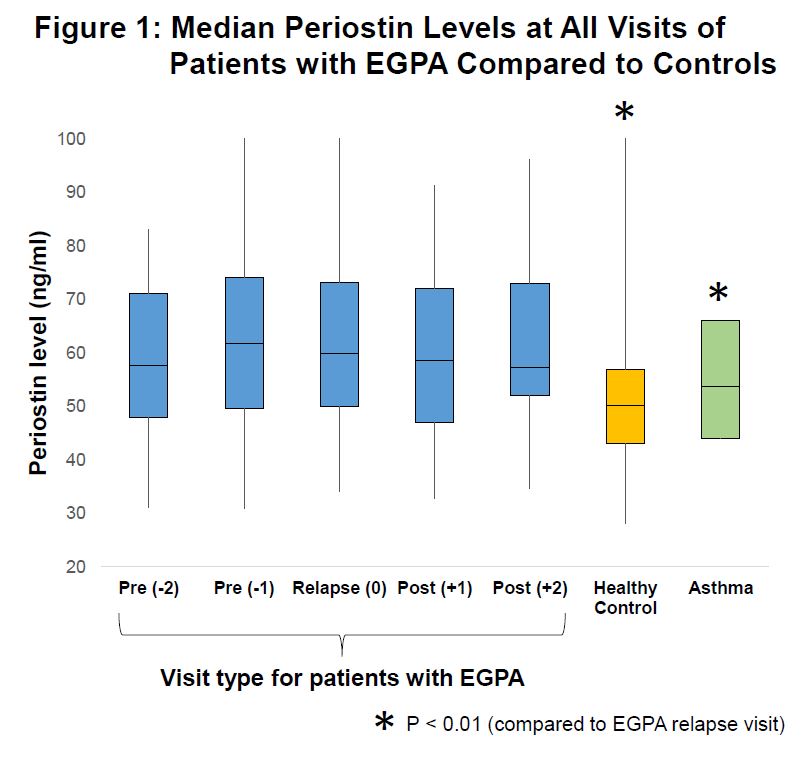Session Information
Session Type: ACR Poster Session B
Session Time: 9:00AM-11:00AM
Background/Purpose:
Identification of a biomarker to predict relapse in eosinophilic granulomatosis with polyangiitis (EGPA; Churg-Strauss) would enhance the ability to personalize treatment options and improve outcomes. Periostin is a protein which facilitates eosinophil-mediated inflammation and fibrosis and is involved in other eosinophilic syndromes. This study examined the value of serum periostin in identifying disease relapse in patients with EGPA.
Methods:
Participants enrolled in a multicenter, prospective cohort of patients with EGPA who met the 1990 American College of Rheumatology classification criteria for Churg-Strauss syndrome were included in this study if they had a relapse (defined as BVAS > 0) during follow-up. Serum levels of periostin were measured, using the ElecsysâPeriostin assay (Roche Diagnostics, Penzberg Germany), at relapse visit as well as 2 pre- and 2 post-relapse visits, if available. Periostin level between visits (pre- vs relapse, post- vs relapse, all remission vs relapse) were compared using Student’s t-test. Mixed-effect models were used to examine the association between periostin levels and relapse, with the patient as the random effect to allow for assessment of changes within-patient, and adjusting for ANCA status (positive or negative ANCA), active asthma at visit, and time from relapse visit.
Results:
There were 49 patients included in the study: 14 (29%) were anti-myeloperoxidase-ANCA positive and 25 (51%) had experienced a relapse at some point prior to enrollment. Although there was no significant difference in periostin levels at relapse compared to all remission visits (60 vs 58 ng/ml, p = 0.41), the periostin levels were significantly higher in patients with EGPA compared to previously published levels using the same assay measured in healthy controls and patients with asthma (Figure 1). No significant difference was found comparing the periostin level between pre-visit vs relapse visit (p=0.59) or post-visit vs relapse visit (p=0.20). In the mixed-effect models, periostin level, change in periostin, and percent change in periostin were not associated with relapse (beta coefficient 0.007 [95% CI -0.07, 0.08] p=0.87, -6.1 [95% CI -13.9, 1.7] p=0.13, and -0.03 [95% CI -0.14, 0.07] p=0.55, respectively).
Conclusion:
Periostin levels in EGPA are higher than other previously studied cohorts, specifically healthy populations and patients with asthma, and are relatively stable over time. Serum periostin does not discriminate active from inactive disease in EGPA.
To cite this abstract in AMA style:
Rhee RL, Holweg CT, Cuthbertson D, Carette S, Khalidi NA, Koening CL, Krischer J, Langford CA, McAlear CA, Monach PA, Moreland LW, Pagnoux C, Seo P, Specks U, Sreih AG, Ytterberg SR, Merkel PA. Serum Periostin As a Biomarker in Eosinophilic Granulomatosis with Polyangiitis [abstract]. Arthritis Rheumatol. 2017; 69 (suppl 10). https://acrabstracts.org/abstract/serum-periostin-as-a-biomarker-in-eosinophilic-granulomatosis-with-polyangiitis/. Accessed .« Back to 2017 ACR/ARHP Annual Meeting
ACR Meeting Abstracts - https://acrabstracts.org/abstract/serum-periostin-as-a-biomarker-in-eosinophilic-granulomatosis-with-polyangiitis/

